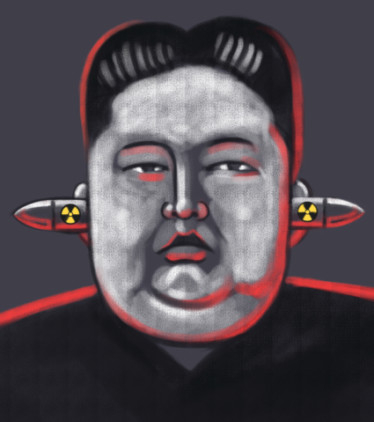
North Korea’s recent announcement that it will not allow any foreign tourists to cross its borders, in order to protect itself from Ebola, evoked chuckles around the world. “The Ebola virus should know better than to visit that place,” observers quipped. Even as global developments unfold at a dizzying pace, North Korea seems to plod along rather consistently in a sort of Stalinist netherworld. But that netherworld’s growing nuclear arsenal is no laughing matter.
North Korea’s apparent immutability makes any unexpected development seem like a sign that something major is afoot. When a month passed without new footage of the country’s leader, Kim Jong-un, international observers eagerly speculated about his health, personal security and hold on power. After all, they reasoned, Kim would not have missed attending important events, including a ceremony honouring his father and grandfather, Kim Jong-il and Kim Il-Sung, unless something serious had occurred.
No sooner had Kim returned to the spotlight, sporting a limp and a cane, than the regime sparked a fresh round of speculation by releasing Jeffrey Fowle, a 56-year-old American who had been detained for months for leaving a Bible in a hotel room. Having been forsaken by its few allies in recent years, North Korea, outsiders assume, feels more isolated than ever. Against this background, Fowle’s release, which apparently carried no quid pro quo, has been interpreted as a sign of the regime’s readiness to initiate a long-awaited dialogue with the US.
However, any assessment of North Korea’s intentions at this point is mere guesswork and the release of one detainee does not make for convincing evidence. What is certain is that the absence of any sustained meaningful dialogue with North Korea is a source of serious concern. The South Korean leadership, which understands better than anyone the danger that North Korea poses, has long recognised the need for such a dialogue. Indeed, despite North Korea’s refusal to make any real concessions on human-rights issues and family visits, much less its military posture, South Korea has regularly sought to establish a process for such discussions.
The challenge for the US is to support South Korea’s efforts, without wavering on its demand that the North participate in a new round of nuclear talks, based on the terms to which it previously agreed. Opponents of this approach insist that there is no place for such “preconditions” in a genuine dialogue, in which the relevant parties are simply supposed to exchange views. But the fact is that North Korea’s refusal to acknowledge its 2005 commitment to abandon its nuclear programme effectively renders any prospective dialogue moot. After all, reversing the country’s nuclear buildup was a fundamental reason for launching talks in the first place.
That goal has been the driving force behind the six-party talks — among China, Japan, North and South Korea, Russia, and the US — for more than a decade, with all participating countries making important concessions with regard to economic and energy assistance, security guarantees and diplomatic recognition. After years of frustration, North Korea began to implement in 2007 what amounted to a “grand bargain.” But it later balked at the verification regime — a crucial feature of any such agreement — and subsequently reneged on its obligations.
Whether then-leader Kim Jong-il ever intended to fulfil those obligations remains unclear. But there is evidence to suggest that possibility. Most notably, North Korea shut down a nuclear reactor that had already produced enough nuclear material for several bombs and could have produced much more. (Claims that the reactor was on its last legs lack any legitimate basis, given that every machine in North Korea appears that way.) In any case, Kim Jong-il appeared at least to be interested in the agreement, if only to maintain North Korea’s relationship with China. The same cannot be said for his son and successor, whose actions do nothing to suggest even a remote interest in denuclearisation. In both word and deed, Kim Jong-un seems intent on using nuclear weapons to enhance North Korea’s global status.
Time may not be running out, but it is not standing still, either. As General Curtis Scaparrotti, the top US military commander in South Korea, recently warned, North Korea may already have access, through Iran and Pakistan, to the expertise needed to miniaturize a nuclear device and mount it on a missile. If it cannot do that yet, it will be able to soon enough. Moreover, given North Korea’s investments in bolstering its conventional forces and the large share of South Korea’s population located near the border, the North could focus on developing battlefield nuclear weapons — adding a new dimension of horror to any conflict on the Korean Peninsula.
With the two-year election clock in the US about to be reset to 2016, there is probably enough time for one more major push for substantive nuclear talks with North Korea. Given the country’s negotiating record, such an effort will depend on the triumph of hope over experience; but it is worth a try, given the lack of alternatives.
Indeed, the challenge extends far beyond convincing North Korea to participate. The US cannot hope to make any progress without support from China and others, including Russia, or without all countries bringing their leverage to bear. Russia cannot forever maintain a foreign policy based on spite.
The international community, as fragmented and conflicted as it currently is, can find common ground in recognising the threat that North Korea’s unpredictable and enigmatic regime poses and take cooperative action to mitigate it. The first step in that process must be dialogue based on commitments already made. A dialogue with the deaf can be difficult; but a dialogue with an amnesiac can be no dialogue at all.
— Project Syndicate
Christopher R. Hill, former US assistant secretary of state for East Asia, is Dean of the Korbel School of International Studies, University of Denver, and the author of the forthcoming book Outpost.










